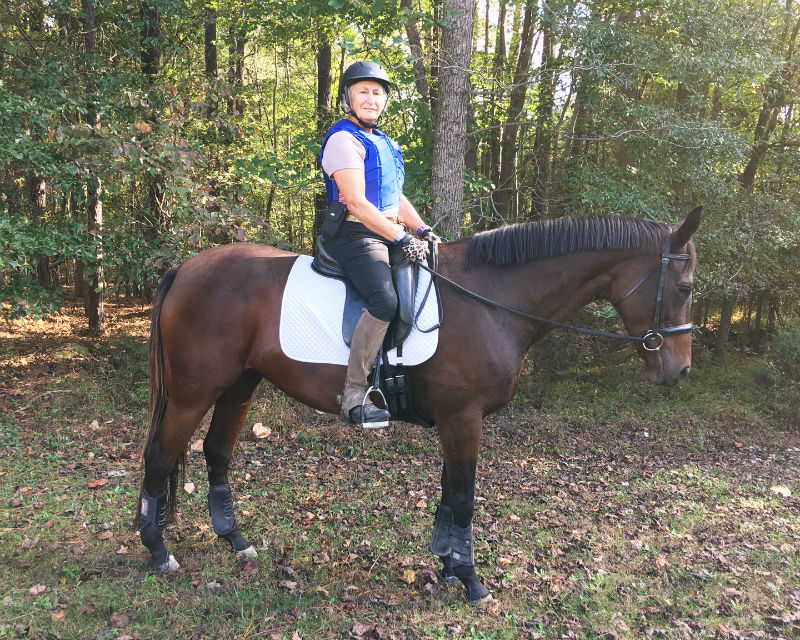By: Erin Shea, @BH_EShea
In only six years The Jockey Club's Thoroughbred Incentive Program—a program that offers annual awards for off-track Thoroughbreds to encourage the retraining of racehorses—has grown from offering awards and classes at 150 horse shows to 1,200 shows in 42 states and six Canadian provinces for 2018.
In those six years, fueled by major strides in Thoroughbred aftercare, T.I.P's growth continues as more incentives are created for riders who compete at horse shows on Thoroughbreds.
"I think the numbers that we're seeing in participation and the interest in having a Thoroughbred—I wish there was a way to capture that, because at least anecdotally, it's huge," said T.I.P. coordinator Kristin Leshney.
"If you'd asked me six years ago 'Where would you like to be?' it would be here ... it's a short amount of time so it's really incredible what T.I.P., TAA (Thoroughbred Aftercare Alliance), and RRP (Retired Racehorse Project) have been able to do. To make the Thoroughbred back in fashion, for lack of a better word, and (to have) people out there looking for a Thoroughbred so they can compete in these kinds of programs, which is what we wanted, I think that's pretty great."
Now, as the organization sets its sights on the future, Leshney said the goal is to make their year-end T.I.P. Championships, which started in 2017, a bigger and better event. This year, with the second annual event scheduled for Sept. 9 at the end of the New Vocations All-Thoroughbred Charity Horse Show at the Kentucky Horse Park, three new disciplines will be incorporated into the T.I.P. Championships—dressage, western pleasure, and western dressage.
"My goal is to make our year-end championships the bigger part of this program so that's what we're working toward," Leshney said. "Our horse show awards will always be a part of T.I.P., and I see that expanding still down the road to more states and more disciplines, but probably where you see the most growth going forward is our own (championships)."
For the program, it was a slow expansion toward areas in equestrian disciplines that were missing that spurred the addition of the three new disciplines.
"We didn't want to put the cart before the horse. We wanted to make sure there was interest there, and we do a lot of slow growth—we started with hunter/jumpers and english pleasure; we definitely had a lot of people asking for dressage; we've had a lot of interest in western pleasure; and western dressage is complemented nicely with the regular dressage," Leshney said.
"We already do championship awards with the U.S. Eventing Association and we'll continue that this year. So we're trying to hit as many disciplines and Thoroughbreds participating there as we can."
Even with more awards and opportunities added for competitive Thoroughbred riders, the T.I.P. isn't leaving out those equestrians who don't want to compete and show. The program's Thoroughbred Recreational Riding Incentive Program started about a year ago and Leshney said there have been 44 horses/riders who have reached the first milestone of 25 hours of riding and eight who have reached the 100-hour milestone. The Recreational Riding Program was another way for T.I.P. to be a part of the second careers of horses that are not actively competing. It's also becoming a way to show that Thoroughbreds can have meaningful lives off the track without stepping foot in the show ring.

When Yes Virginia and owner Sarah Blanchard aren't competing in dressage, they log trail riding hours as part of the Thoroughbred Recreational Riding Incentive Program
"We started T.I.P. to try to include all of the Thoroughbreds, if we could, and really what we were missing was the recreational riding horses. So this program has filled that gap a little bit," Leshney said. "We have the non-competition awards for the horses who are doing therapeutic riding and still have a career, so to say ... and this was kind of that last gap. It's been very successful and I think it'll keep growing the more we promote it.
"My favorite part of the recreational riding is the stories that come out of it. Between people who had a show horse that was retired or had an injury and this motivated them to go out and ride and the people with older horses ... those are the kinds of things that we want to make people realize—Thoroughbreds don't necessarily have to be a competition horse, they can be your family horse, they can be your trail horse, your companion."




